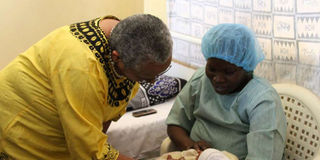Say no to political lip service and demand health systems that work

Women need healthcare services more than men, especially during pregnancy when several months are spent visiting the antenatal clinic, even after delivery. PHOTO| FILE| NATION MEDIA GROUP
Last Tuesday Kenyans went to the ballot to elect political leaders who will run the nation’s affairs for the next five years. This happened in a hotly contested election where 14,523 candidates were competing for 1,882 positions.
Among the stars of the election was the 24-year-old Igembe South MP-elect John Paul Mwirigi, a university student who with no budget campaigned on foot and on the goodwill of boda boda riders. There was also Boniface Mwangi whose Ukweli Party brought a whole new meaning to campaign finance by leveraging crowd-funding on social media.
UNEDUCATED VOTERS
Often lost in the glitz and glamour of the campaigns, however, is the most important building block of any political bid – the message. The electorate take to social media to discuss theme colours, crowd size, campaign convoys, billboards and theme songs, but very few can tell you what the candidates promised to deliver.
Voters have no idea what the roles of the governors, members of the national assembly and senate, and members of the county assembly are, hence they lap up the false promises they are given without question.
We want to be assured of basic education, health, infrastructure, security, economic growth and social justice, so every aspirant crafts their so-called manifesto around these, even when the position they are vying for has no direct influence on the things they are promising. The aspirants tell voters what they want to hear.
The road to the local market centre in my home village has been a campaign promise since the one-party era in the 1980s. Every Member of Parliament has campaigned on the promise of elevating the road to bitumen standard.
It is a key road that connects Keroka, Kisii and Nyamira, opening up these towns as markets for farmers’ produce and allowing access to health and administrative services.
The market centre is less than 20 kilometres away from the three towns. Its construction was launched in 2011 and Nyamira County put it in its 2013 to 2017 strategic plan, with intentions to complete it by 2015, but the work is less than halfway complete with tarmac on less than 40 per cent of it. Even the president took a moment to relaunch it yet again when he was on his campaign circuit before the just concluded elections.
WOMEN SHOULDER THE WEIGHT
Most campaigns in rural Kenya target women as the most reliable voters. In our villages, the women are the backbone of the community. ActionAid looked at the work women do and found that in Kenya women work 1.4 times more than men.
Hence, as our women are home taking care of babies, children and the sick, minding the farms, fetching water and looking for firewood; work which is largely unpaid, men spend most of their time either in paid activities (employment) or in unproductive activities (socialising, technology-based activities). Hence for women, any campaign promise to ease their work is welcome and is more likely to influence their opinions on who to vote for.
Herein comes the importance of health services. In general, women need healthcare services more than men. They get pregnant and spend seven months visiting the antenatal clinic, they deliver in hospital and thereafter the visits continue for months with focus on the baby.
Children under age five are prone to common ailments and more likely to spend a lot of time in health facilities with their mothers. Child health is the responsibility of mothers in most homes, hence lack of access to healthcare is felt most by women.
It is therefore absurd when women throw health concerns out of the window during election season. Over the years, our campaigns have become extremely materialistic in complete disregard to the law. The tough economic times have reduced able-bodied men and women to election beggars who throw out their dignity and replace it with greed-seeking instant gratification. These men and women have a right to demand better services and infrastructure, but they sell their birthright for a few hundred shillings.
The world unites to fight for women and children’s health, but women must be at the frontline in this battle or else their comrades in arms will be fighting a losing battle. The pregnant woman who opens her door at midnight to receive a pair of flip-flops, a leso and Sh200 in exchange for her vote, must realise that in a few weeks she will give birth on the floor of a health centre with no midwife in attendance.
The chief used to intimidate people to vote for a certain candidate in exchange for a thousand shillings will be the same one issuing death notifications for babies who died of diarrhoea at home, and he is no different from Hitler.
Every five years, Kenyans get a new opportunity to choose new leaders to manage their health resources, but we are yet to grasp this concept. In a country where 90 per cent of the population depends on public health facilities, we need to start appreciating just how critical it is to demand that the health agenda be top on the list of our priorities. We need to say no to lip service and fight the wanton wastage of public health resources we have witnessed in the past few years. Women, we need to rise up and demand real health systems that work!



